The Spellman Files (3 page)
Read The Spellman Files Online
Authors: Lisa Lutz
T
he Spellman residence is located at 1799 Clay Street on the outskirts of the Nob Hill district of San Francisco. If you walk half a mile to the south, you’ll reach the Tenderloin—San Francisco’s heterosexual red-light district. If you head too far north, you’ll land in some variety of tourist trap, whether it’s Lombard Street or Fisherman’s Wharf or, if you’re really unfortunate, the Marina.
Spellman Investigations is conveniently located at the same address. (My father loves to joke about his commute down the stairs.) The building itself is an impressive four-level Victorian, painted blue with white trim, that my parents could never have afforded had it not been passed down from three generations of Spellmans. The property itself is valued at close to two million, which means my parents threaten to sell at least four times a year. But those are empty threats. My parents would rather have old furniture, chipped paint, and economic uncertainty than European vacations, retirement funds, and a home in the suburbs.
At the entrance to my family’s home/business, you will find four mailboxes that read, from left to right: Spellman, Spellman Investigations (we’ve only had one mail carrier who routinely differentiated between the two), Marcus Godfrey (my father’s long-lived undercover name), and Grayson Enterprises (a dummy business name that our firm uses for lighter cases). There are also two or three PO boxes around the Bay Area that the business sustains when more camouflage is necessary.
Once inside the Spellman home, you come upon a staircase that winds up to the second level, where all three bedrooms are located. To the right of the staircase is a door with a hanging sign that says
SPELLMAN INVESTIGATIONS
. The door is locked during all nonbusiness hours. Left of the staircase is the entrance to the living room. A threadbare couch with a worn zebra-skin pattern once provided the centerpiece to the room. Now it is an unassuming brown leather sofa. Mahogany furniture orbits the couch—each piece would qualify as an antique, but neglect has diminished their value. The only change the room has seen in the last thirty years (other than the couch) is the replacement of the wood-paneled Zenith TV (circa 1980) with a twenty-seven-inch flat-screen that my uncle bought after a very rare, but successful, day at the racetrack.
Behind the living room is the kitchen, which extends into a modest dining room with still more neglected antiques. While I’m still downstairs, I should unlock the door to Spellman Investigations.
My family’s office sits on the ground level, in a location that would be called the den in any other home. Four secondhand teacher’s desks (the beige metal variety) form a perfect rectangle in the center of the office. Thirty years ago there was only one computer—an IBM—atop my father’s desk. Now there is a PC on each of the four and a communal laptop in the closet. There are half a dozen file cabinets in an assortment of colors (also secondhand) encircling the room. Other than the industrial-size paper shredder and dusty blinds, that’s pretty much it. Files are sometimes stacked two feet high on each desk. Scraps from the shredder are scattered about the floor. The room smells of dust and cheap coffee. The door at the far end of the room leads down to the basement, where all interrogations take place. David used to claim that the basement was the best place in the house to do homework, but I wouldn’t know about that.
D
avid and I began working for Spellman Investigations when we were fourteen and twelve, respectively. While I had already made a name for myself as the difficult child, my status as employee redeemed many of my other less-than qualities. I suppose it surprised no one that, generally speaking, I took well to breaking the rules of society and invading other people’s privacy.
We’d always begin in the trash. That was routinely the first job assigned to the Spellman children. Mom or Dad (or the off-duty cop du jour) would pick up refuse from a subject’s residence (once the trash is left out for the sanitation department, it is considered public property and legal to appropriate) and drop it at the house.
I’d put on a pair of thick, plastic dishwashing gloves (and occasionally a nose clip) and sift through the garbage, separating the trash from the treasures. My mother gave precisely the same instructions to all of us: bank statements, bills, letters, notes, you keep; anything that was once edible or contains bodily fluids, you trash. I often considered these instructions incomplete. You’d be surprised how many things fall into the
none of the above
category. Garbology often made David violently ill, and by the time he was fifteen, he was pulled off this assignment altogether.
The year I turned thirteen, my mother taught me how to do court record searches in the Bay Area. Most of our work at the time involved background checks, and a criminal record search was the first step. Once again, the instructions were simple: Look for derogatories. Translation: Look for something bad. When we couldn’t find a derogatory, the disappointment was palpable. People—the ones we knew by name or Social Security numbers—disappointed us if they were clean.
Background checks were the purest form of grunt work. They often involved traveling throughout the Bay Area to various courthouses, cross-checking names in record books. Before the municipal courts were dissolved in California, this meant visiting the records offices of at least four separate courthouses per county: superior criminal, superior civil, municipal criminal, and municipal civil (and occasionally small claims court).
Later on, our research time was abbreviated when the superior and municipal courts merged and most of the records could be found on microfiche. In the last five years, virtually all courthouse information has been transferred to computerized databases, and unless we were looking for a case more than ten years old, all the research could be done from inside the Spellman offices. What was once a twelve-to-fifteen-hour job turned into four hours or less behind a desk.
Aside from background research, the databases can also be used to locate an individual whose whereabouts are unknown. Acquiring a Social Security number is the key to this task. It is the holy grail of the PI world. But Social Security numbers are not public record. If you are not provided a Social Security number from the client, then a full name and a DOB (date of birth) or at the very minimum a full name (hopefully unusual) and city of residence are required. The next step is plugging a name and DOB into a credit header report. These reports provide some of the information on a complete credit report, such as address history and any bankruptcies and liens against the individual, but not the full report, since credit reports are also not public record. Through a credit header you can often get a partial SSN. Since one database might hide the first four digits of the SSN and another might hide the last four, if you look at enough of them, you can often assemble a full SSN.
Database research requires an attention to detail that my former teachers would not believe I was capable of. However, I liked finding dirt on people. It made all my trespasses seem trivial.
You could say first they tested our stomachs, then our patience, and finally our wits. For the second-generation Spellmans (and maybe even the first), surveillance was what we lived for. It was the part of the job that made you not care that you were working for your parents after school. But it is not without its lows. People aren’t on the move all the time. They sleep, they go to work, they have four-hour meetings in office buildings, leaving you waiting in the foyer, your stomach growling and your feet aching. I loved being on the move; David loved the downtime. He used it to catch up on his homework. All I did was smoke.
Age 14: My first surveillance job was on the Feldman case. John Feldman hired my family to keep an eye on his business partner and brother, Sam. John had a feeling that his brother was involved in some shady business dealings and wanted us to tail Sam for a couple of weeks to see if his instincts were correct. While John’s instincts were, in fact, correct, his assessment was not. Sam, from my observation, showed little interest in business altogether. He did, however, show great interest in John’s wife.
David and I were both surveillance neophytes when we began the Feldman detail. I was an expert by the end. My father would drive the van, my mother the Honda. Both connected with us via radio. When Sam was on foot, David or I took point. We’d jump out of the car, maintain a reasonable distance on foot, and announce our coordinates into the radio so that at least one vehicle would always be ready to pick us up should Sam decide to take a cab, bus, or cable car. Mostly he took a room at the St. Regis.
What we learned on the Feldman job, aside from the fact that Sam was screwing John’s wife, was that my years of sneaking around paid off. Simply put, my life to date had ingrained in me a certain natural stealth, had taught me how to test limits, and had disciplined me to know precisely how much I could get away with. I knew how to read people. I knew when I could follow a subject onto public transportation or when I needed to call a cab. I knew how long I could sustain the tail and I knew when it was time to quit. But half of it was that I didn’t look like the sort of person who followed people for a living.
At the age of fourteen, I was already about five foot six, just two inches shorter than my current height. I looked a few years older than I was, but still like a student—in wrinkled T-shirts and worn-out denim. There was nothing to notice or not notice about my appearance—long brown hair, brown eyes, no freckles or identifying marks. If I had taken entirely after my mother, I might even be beautiful, but my father’s genes have blunted my features and I hear the word
handsome
far more than
pretty.
Still, at my present age of twenty-eight, with the help of a best friend (who is a hairstylist) and a slightly improved fashion sense, I look all right. Let’s leave it at that.
Age 15: Uncle Ray asked me what I wanted for my birthday. I told him a bottle of vodka, and when he said no, I suggested he teach me how to pick locks. This is not a common activity in the arsenal of PI skills, but he taught me anyway since he knew how. (When my mother discovered this fact, she gave him the silent treatment for two weeks.) I would never use this skill on the job, but I’ve found many recreational uses for it since.
Age 16: A pretext call is getting information under false pretenses. This was where my mother was genius. She has acquired SSNs, DOBs, entire credit card bills, bank statements, and employment histories all from a single phone call that might go something like this:
“Good morning. May I speak with Mr. Franklin? Oh, hello, Mr. Franklin. My name is Sarah Baker and I work for ACS, Incorporated. What we do is locate individuals who may have lost track of some of their assets. We have discovered over a thousand shares of a blue-chip stock in the name of one Gary Franklin. I need to verify that you are the same Gary Franklin. If you could give me your date of birth and Social Security number, then I can begin the process of transferring the stock certificates back to you…”
While I consider myself talented in the pretext department, my mother is and will always be queen.
Age 17: I drove on my first surveillance. For a year after I got my license, my dad would practice with me on the road. The concept is simple—aggressive but safe driving. Never drop more than two cars back (if you’re working alone) and know your subject, anticipate where he/she might be going, so that you do not rely entirely upon sustaining a visual. This was my father’s area of expertise. Having worked vice for so many years, he had a feel for the road and an almost psychic ability to predict a subject’s next move.
As my dad taught me most of the on-the-road tactics, Uncle Ray taught me the off-the-road shortcuts. For instance, when you’re driving at night, it’s easier to maintain a visual on a car with only one working taillight. I still remember the day Uncle Ray passed me a hammer and told me to smash out the taillight of Dr. Lieberman’s Mercedes-Benz.
That
was a perfect day.
Age 18: the magic year in my employment with Spellman Investigations. Because most of our work relates to legal matters, it is important to have the investigator be of legal age. At eighteen, I could serve court papers, perform interviews, and begin accruing the six thousand hours of fieldwork required for my PI license. The only thing standing between me and my license was a criminal record. A thorough background check is done on all potential PI candidates. Everything that happened before I turned eighteen would be sealed in my juvenile record, but as my father reminded me, I needed to stay out of serious trouble after that.
Age 21: On my birthday, I took the two-hour multiple-choice exam and three months later got my license.
David, on the other hand, ended his career with Spellman Investigations when he was sixteen, citing its interference with his schoolwork. He would never work for my family again, although one day we would work for him. The truth was, the job didn’t interest David. He thought people had a right to privacy. The rest of us did not.
I
t was the nature of the business: snooping, legally and sometimes illegally. Like an executioner, you harden yourself to the truth of your job.
When you know what you and your parents are capable of doing to pry into another person’s life, erecting highly structured fortresses to protect your own privacy becomes second nature. You grow accustomed to your mother asking your brother if you have a boyfriend these days and then following you, when you venture out, to get a look at him. You think nothing, when you’re sixteen, of taking three buses in opposing directions and killing an hour and a half to lose her. You install deadbolts on your bedroom door and instruct your brother to do the same. You change those locks twice a year. You interrogate strangers and spy on your friends. You’ve heard so many lies that you never quite believe the truth. You practice your poker face in the mirror so often that your face freezes in that expression.
My parents always had a more than passing interest in the company I kept. My father insisted that the boys in my life were directly responsible for my juvenile-delinquent tendencies. My mother, more accurately, assumed that I was the bad influence. As my parents theorized about my various relationships and their effect on my alcohol consumption and truancy status, Petra theorized about my habit of sabotaging relationships. She said I either chose men who were entirely inappropriate for me, or I tested their patience to the point where they had to break up with me. I told her she was wrong. She suggested I make a list and see for myself.
Like my lists of basement interrogations and unproven crimes, the list of ex-boyfriends
1
is like a cheat sheet of my past. In the interest of brevity, I kept the information to a minimum: number, name, age, occupation, hobby, duration of relationship, and last words—i.e., reason given for termination of relationship.
LIST OF EX-BOYFRIENDS


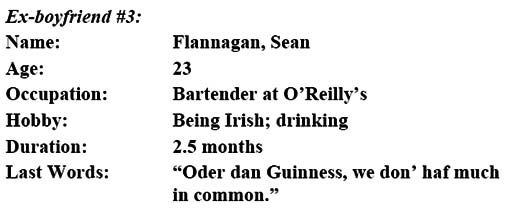
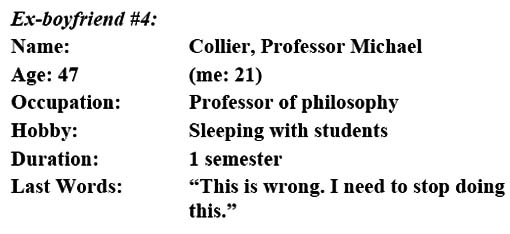
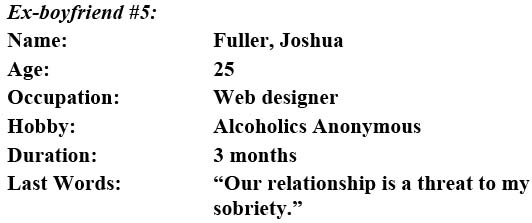
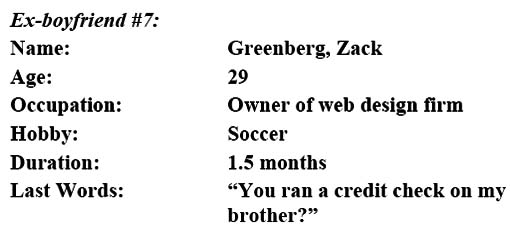
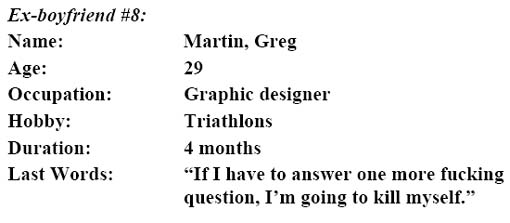
As for Ex-boyfriends #6 and #9, I’ll get to them later. Some people you simply cannot reduce to the data that will fit on a three-by-five index card. No matter how hard you try.
Sometimes I create a list at the moment of the event. Other times, the list is formed long past its point of origin, when its significance ultimately becomes clear to me. Even if I were to do away with all the other lists, this one must remain, because this is the list that documents the end of my reign of terror in the Spellman household.
THE THREE PHASES OF MY QUASI-REDEMPTION
- Lost Weekend #3
- The Foyer-Sleeping Incident
- The Missing-Shoe Episode
As you might have gathered, Lost Weekend #3 is part of its own separate list. Eventually, when the scraps of paper that contained my lists were transferred to a password-protected computer file, I created a spreadsheet so one (me) could easily cross-reference data that appeared on more than one list. As for the Lost Weekends, there were twenty-seven total. At least that’s the number I came up with. It wouldn’t surprise me if there were more that I didn’t know about.